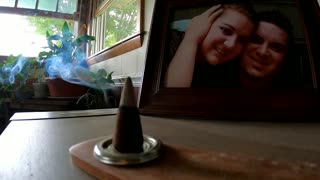Premium Only Content

The Vessels of Incense
Listen on Podcast: https://anchor.fm/joanie-stahl/episodes/The-Vessels-of-Incense-e15srru
Thank you for supporting this ministry, I lovingly refer to as "The Little Green Pasture." Click here: PayPal: http://paypal.me/JoanStahl
Please prayerfully consider becoming a ministry partner:
Patreon: https://www.patreon.com/joaniestahl
**Contact Email: jsfieldnotes@gmail.com
**Send Donations To: Joanie Stahl - P.O. Box 1386 - 205 Avenida Del Mar - San Clemente, Ca. 92672
**You can also visit and subscribe to me on Rumble: https://rumble.com/account/content?ty...
There is an aroma that people put forth outwardly from within themselves. They may not be award of it, but it is an aroma of what is in their hearts. It exudes from their actions, words and their bodily presence. Even if they do not speak a word, there is something about them that leaves either an aroma of "death unto death, or "life unto life." There is something about a person who lives in the light of Jesus Christ. They are always taking in His word and walk in it.
There is an extra 'something" about them. I would say it is something "not of this world." There is something coming from them. An indescribable 'something' which is an extra element to what they say. You feel that it is not only the words but the very virtue that comes out when they speak, or by reason of their presence. This is what Paul is speaks about in the verse below.
"Now thanks be unto God, which always causeth us to triumph in Christ, and maketh manifest the savour of his knowledge by us in every place. For we are unto God a sweet savour of Christ, in them that are saved, and in them that perish: To the one we are the savour of death unto death; and to the other the savour of life unto life. And who is sufficient for these things?" 2 Corinthians 2:14-16.
Paul views himself as one of those prisoners, led in the triumphal procession, as an object of public exhibition as to the triumph of the great Warrior Jesus Christ. He has seen himself as in the train of the triumph of the Lord, being on full view as a demonstration of the greatness and victory of the Lord. Now he takes the place of an incense bearer in the procession. And implies that he now passes on through the world bearing incense, and that incense is saying two things, having two effects, speaking to two different classes of people. It relates to life and death.
This becomes an inward life for Paul, and he does not regard himself as simply carrying a censor of incense in an outward sense. He regards himself as the vessel, in a strange, deep, inward way so as to become a very part of his own being, not only the giver forth of the sweet savor but that sweet savor itself. That he is the means by which this effect is registered upon these two different classes of people.
There is a deep, strong, solemn word for all of us who stand in that position as the Lord's servants. It's about the thing that is going forth from us. The thing which is the effect of our lives, according to these words is the knowledge of Christ everywhere, not just as by us, but because of us, people are coming to the knowledge of Christ. The very object of our being is that Christ should be known because of us. The divinely appointed way of men coming to know Christ is by our being here, moving among them.
The coming near to the Lord means a ministration of more life. It is only a state of the heart. Are you dead or alive? Indifferent or reaching out to Him? He only draws near to give more of Himself in life to open hearts that are pure and simple. Where there is honesty and openness of spirit. Like Blind Bartemaeus who had very little to throw off of him. That you are obeying whatever light the Lord gives you. We are either in the fuller way of life or the fuller way of death.
~"I confess that the words of Scripture thrill my soul as nothing else ever can; they bear me aloft or dash me down, they tear me in pieces or they build me up after an unrivalled fashion. The words of God have more power over me than ever David’s fingers had over his harp strings. Is it not so with you?" Charles H. Spurgeon
-
 22:37
22:37
JoanieStahlsFieldNotes
1 month agoHeaven Land Devotions - Heaven Is No Dream
1073 -
 4:12
4:12
AbbaApothecary
4 years ago $0.01 earnedIncense Making Demonstration Abba Apothecary
129 -
 0:57
0:57
FishingIndiana
4 years agoTime Laps Incense Cone
24 -
 2:29
2:29
Heather7Light
4 years ago $0.02 earnedVessels created
1503 -
 1:48
1:48
AfricanNewsAgency
4 years ago $0.01 earnedNSRI rescue vessels.
19 -
 LIVE
LIVE
DynastyXL
6 hours ago🔴LIVE: Fortnite The Comeback Stream Starts Here🎃
146 watching -
 LIVE
LIVE
BrightGaming
1 hour agoDragon Warrior 1 (NES): Defeat the DragonLord & Save the Kingdom as Erdrick's Heir with BrightGaming
1,535 watching -
 19:15
19:15
Stephen Gardner
18 hours ago🟢YES! Trump did it! + Elon Musk DROPS BOMBSHELL on Democrat Party!
110K202 -
 29:24
29:24
Afshin Rattansi's Going Underground
1 day agoEx-CIA Advisor & Afshin Rattansi Have HEATED Exchange Over Ukraine Proxy War
3.21K32 -
 1:06:17
1:06:17
Mike Rowe
20 hours agoThe Mastermind Behind THIS Radical Idea At WSU Tech | Sheree Utash #448 | The Way I Heard It
93.6K17